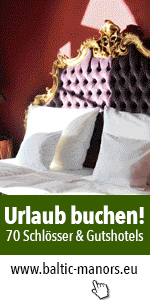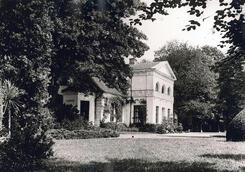Estate Dudinghausen
Dudinghausen at the Hohen Sprenzer Lake was owned by the von Viereck family for over 300 years until they were expropriated in 1945. The feudal estate was first mentioned in a document in 1347 and was erected by the von Duding family during the 14th century on fields of the village of Dechow on a peninsula in the lake. Over time, the name Dudinghausen has taken the place of the former Dechow.
After the von Duding family died out, the estate initially had various owners: the v. Barold family; then the Danish Queen Sophie and later the v. Voß family. In 1660, Jürgen v. Voß pledged the estate to Caspar v. Thun. This pledge also passed through various hands and was finally purchased by Levin Jürgen v. Bassewitz. Since the v. Voß family was unable to redeem the pledge, von Bassewitz ceded all rights in 1702 to Adam Otto v.Viereck, the Royal Prussian Privy Counsellor and Envoy in Copenhagen, who resided in neighbouring Weitendorf and Wattmannshagen.
His son, Adam Otto the Younger, Royal Prussian Minister of State under Frederick the Great, was now the owner of Dudinghausen, but lived in Weitendorf and as well at Buch Castle near Berlin. The estate was inherited by his daughters. Ulrike Charlotte who was married to her cousin, the Royal Prussian Major General and Knight of the Pour le Merite Christian Friederich v. Viereck, took over the estate. From 1797 to 1843 her son, the Royal Prussian War Counsellor Carl Albrecht Friederich v. Viereck was the owner. From 1823 on, he extended the manor house, which had been rather modest until then and had last been rebuilt in 1705, by adding a noble classicist extension.
Up to 1905 further structural additions followed. According to contemporary descriptions, due to these additions especially together with the 14-hectare park on the peninsula, the estate presented a most charming appearance.
His great-grandson, Georg v. Viereck, took the Feudal Oath to the Grand Duke for the last time on 20 February 1915 and led the estate through difficult times until 1945. To escape the approaching Red Army at the end of WWII he had to leave Dudinghausen. The house and farm were demolished in GDR times.
Karl Heinrich v. Viereck-Engel fulfilled the promise made to his adoptive father, Georg v. Viereck, and together with his son, Konrad v. Viereck, reacquired parts of the estate after the political change in Germany, in particular the former castle park.
As buildings of the estate complex, a horse stable and a granary are extant.
...
by Jesko von Viereck


